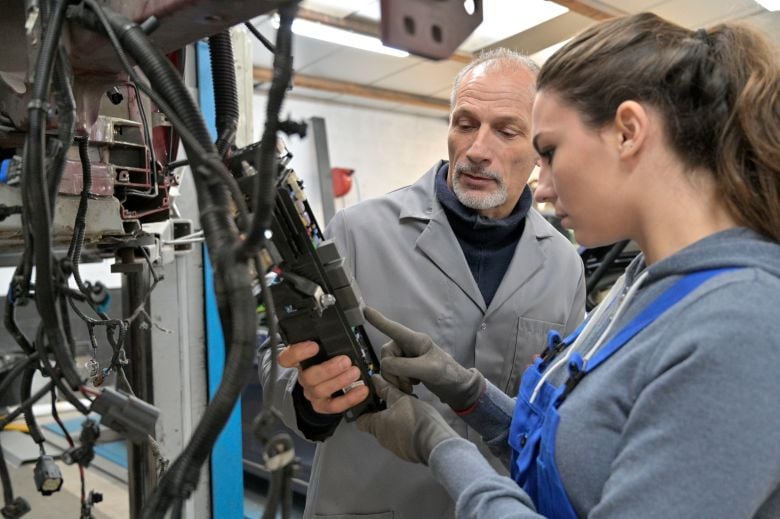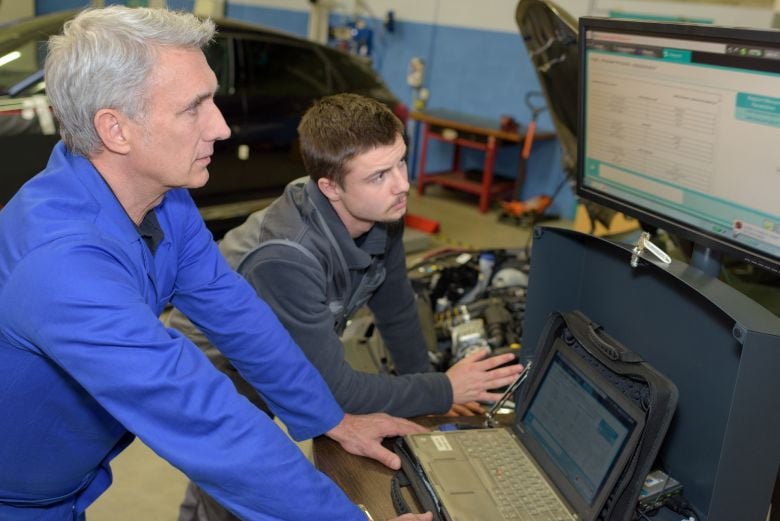
What To Look for In an Auto Technician School
- Vehicle Maintenance, PEAK Squad
- PEAK
- June 10, 2025
Before you start your program search, take a moment to learn more about what you should look for in an auto technician school in the first place.
With college being so expensive and time-consuming, students are turning to trade schools in growing numbers. Trade schools offer hands-on programs that train students for practical career paths—including automotive technology.
An automotive technology program is the perfect way to turn your love of cars into a steady and stable career. However, there's a lot of schools out there and some are better than others.
Before you start your program search, take a moment to learn more about what you should look for in an auto technician school in the first place.


Factors to consider when comparing auto technician schools
Lots of auto technician schools look good online, but it doesn't necessarily mean the program will live up to your expectations. Before you spend time and money preparing an application, research these important factors:
Accreditation
Accreditation is a quality control process for educational institutions. To become accredited, a school has to undergo a rigorous evaluation carried out by a third-party agency. If the school passes, the agency will award the school accredited status. This type of accreditation is known as institutional accreditation.
You should also know about another type of accreditation: programmatic accreditation. It doesn't apply to an entire school. Instead, it only covers specific departments or programs at that school.
Here's the key thing: Institutional accreditation is mandatory but programmatic accreditation, while it's nice to have, is optional.
If a school doesn't hold institutional accreditation from a provider recognized by the Council for Higher Education Accreditation (CHEA), don't go there. Use this CHEA accreditation directory to research the accreditation status of any school you're considering.
Look for accreditations from well-known, nationally recognized bodies like the Accrediting Commission of Career Schools and Colleges (ACCSC). If the auto technician school you like is part of a junior college or other degree-granting institution, it might instead be accredited by an agency that also evaluates universities.
These agencies mainly accredit schools in specific geographic regions. Examples of these organizations include:
- Accrediting Commission for Community and Junior Colleges (ACCJC) of the Western Association of Schools and Colleges (WASC)
- Higher Learning Commission (HLC)
- Middle States Commission on Higher Education (MSCHE)
- New England Commission of Higher Education (NECHE)
- Northwest Commission on Colleges and Universities (NWCCU)
- Southern Association of Colleges and Schools Commission on Colleges (SACSCOC)
Respected programmatic accreditors of auto technician schools include the Automotive Service Excellence Education Foundation (ASEEF), which used to be known as the National Automotive Technicians Education Foundation (NATEF). You can use this ASEEF program search tool to find a specially accredited program in your area.


Curriculum
The next thing you'll want to look at is the program's curriculum. Here, there are several related angles to consider:
- Program length: Auto technician schools offer programs ranging from less than one year to two years or more. Shorter programs help you enter the workforce faster, but longer ones provide more detailed training. Balance these considerations as you mull over your choices.
- Award type: Many auto technician schools award diplomas to students who complete their programs, but some bestow associate degrees instead. Degrees offer the advantage of being upgradable in the future, but a program that leads to an associate degree will usually take at least two years to finish.
- Course content: Programs cover automotive technology topics in many different ways. Some focus entirely on specific vehicle systems, like drivetrains, auto body repair, or electric vehicle (EV) technologies. Others take a broader, more complete approach and make a better option if you're looking to build versatile skills as a generalist.
- Specialization pathways: Finally, schools sometimes offer students the chance to pursue concentrations in specific areas after building general knowledge foundations. Look for programs with pre-set concentration pathways or electives you could strategically use to build the skills that interest you the most.
Facilities and equipment
Once you find an accredited school with a curriculum you like, learn more about the facilities and equipment you'll use there. Ensure these learning technologies represent current industry standards and practices. Attending a laggard school with outdated equipment will only lead to substandard skills that probably won't impress potential employers.
Certification opportunities
In addition to your main academic award—a diploma or degree—some auto technician schools embed additional credentials and certifications into their programs. These can enhance your job prospects, as you'll graduate with more qualifications.
For ideas of what to look for, check out this resource on automotive certifications that can supercharge your career.
Industry connections and job placement assistance
Next, check to see if the school maintains any partnerships with international, national, or local automotive industry companies. These types of partnerships can lead to career-boosting opportunities, like apprenticeships and job recruitment programs.
Also, see what kind of job placement assistance the school's career center offers. Some auto technician schools do a great job of helping their graduates get hired, while others provide only limited support.
One way to tell is to look at:
Student outcome data
It isn't universally required, but some states encourage or compel technical schools to collect and publish student outcome data covering topics like:
- Graduation rates
- Year-to-year student retention rates (in multi-year programs)
- Post-graduation placement rates (in full-time, in-field jobs and/or other education programs)
Higher scores in any of these areas generally indicate a better student experience. However, make sure you're comparing apples to apples by considering how schools perform relative to each other.
For example, a graduation rate of 65% might not seem all that high but if the next-best score among schools you're considering is only 44%, that 65% suddenly looks pretty good.


Costs and financial aid
Trade schools usually cost less than colleges, but they can still be pricey. Remember, education is an investment. If the choice comes down to a school that ticks all the boxes mentioned above but costs more than a lesser alternative, it's probably better to spend the extra money.
The good news is there's lots of ways to get help paying for school, and we've covered them in our technical school financial aid guide. We're also proud to help fund the emerging generation of automotive service professionals through the PEAK Performance scholarships program, which we launched in 2022.
Last steps before applying or accepting an offer of admission
By following the advice outlined above, chances are you'll land in a rewarding program at a quality school. If you want your due diligence to dig even deeper, then you can add a few more items to your to-do list:
- Check online reviews: See what other students have to say about the school by checking review platforms like EDUOpinions or Niche.
- Arrange a campus visit: If you already live near the school, contact the admissions department to set up an in-person visit so you can see the campus yourself and meet your future instructors and fellow students.
- Tour the automotive facilities: You can do this as part of your campus visit, or as a standalone excursion to check out the school's automotive technology department.
If you'd like to learn more about auto technician schools and the career paths they can open, check out our resources on why technical school is a great option and emerging jobs for automotive technology graduates.

